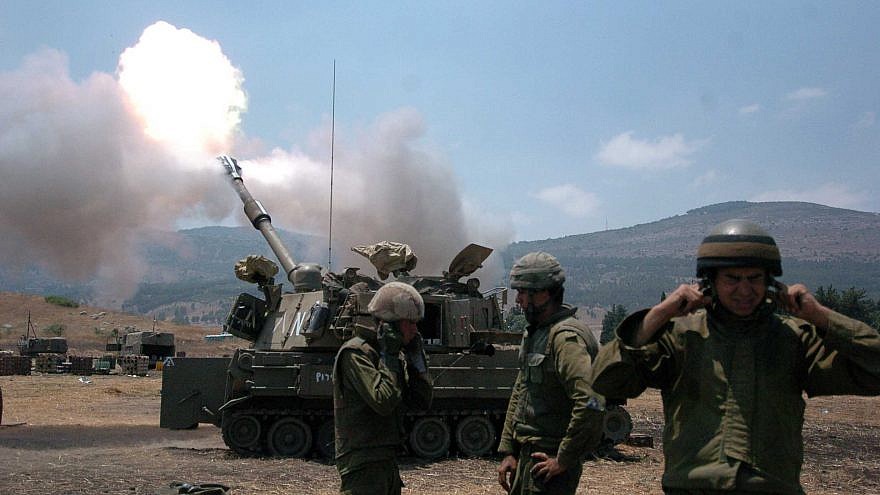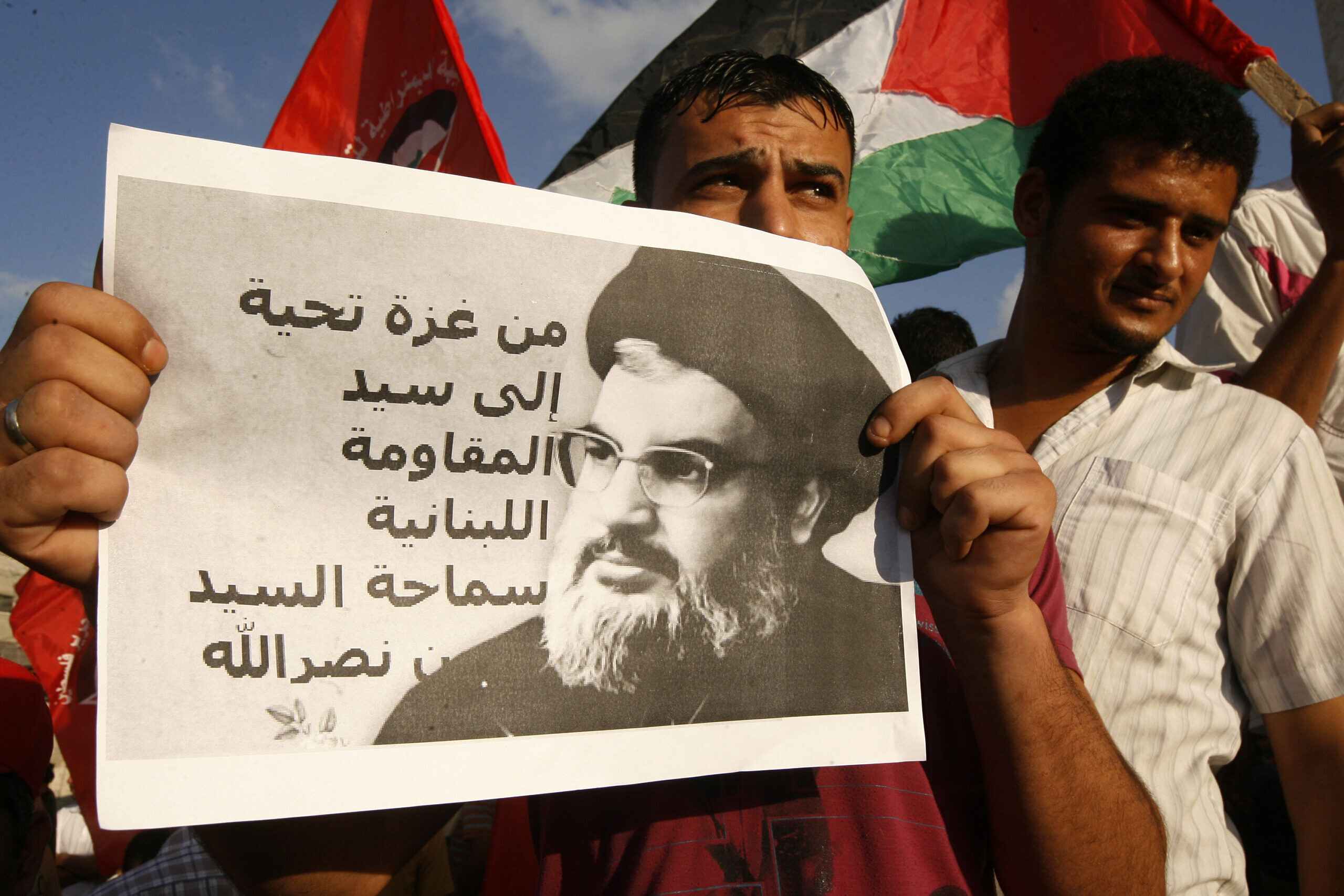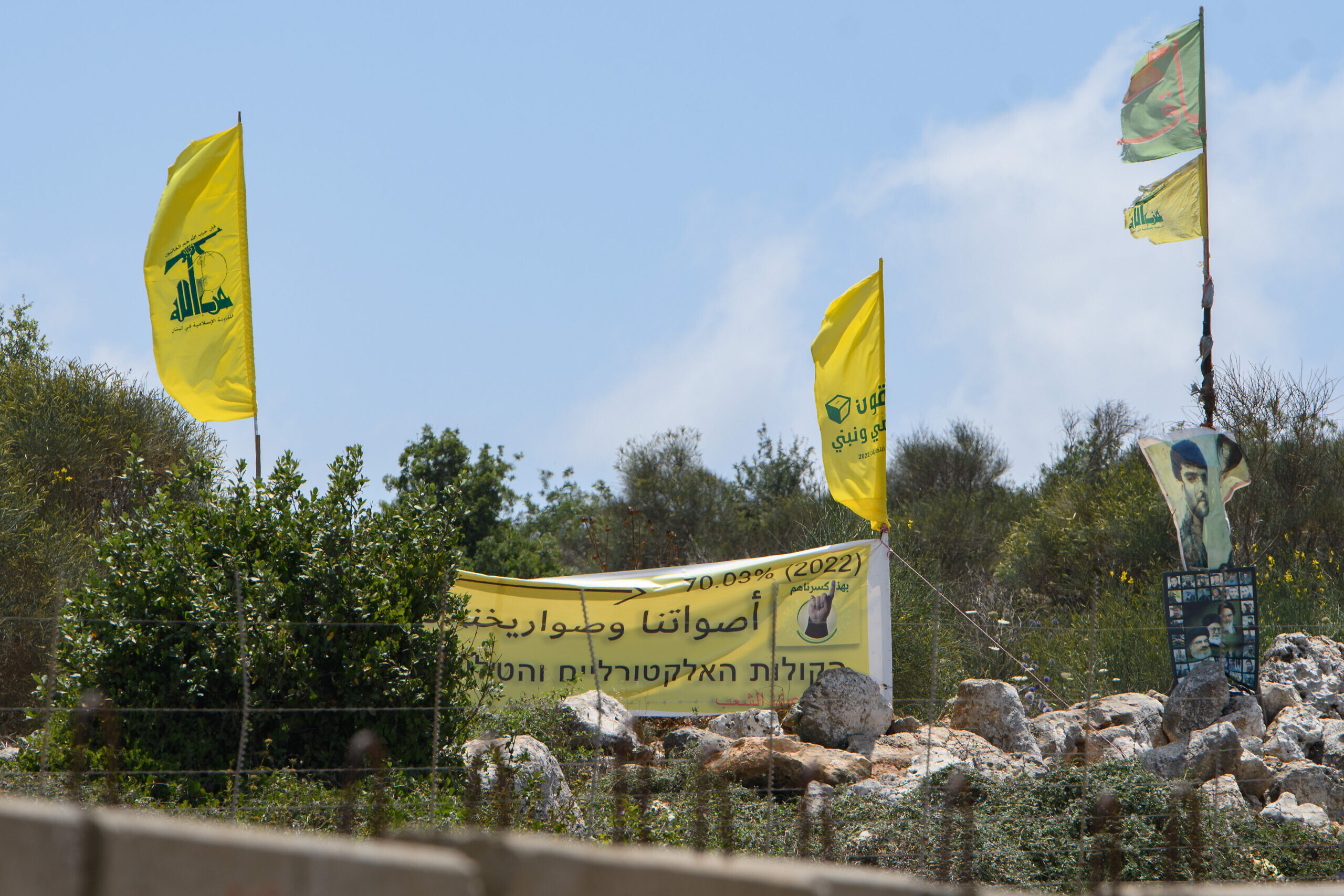by Yaakov Lappin
As tension again spikes between the Iranian-backed proxy and Israel, observers flag key milestones in the evolution of the most heavily armed terror entity, and its leader, Hassan Nasrallah.

(September 12, 2022 / JNS) Tensions between Hezbollah in Lebanon and Israel are higher than usual these days, due to threats being made by the Iranian-backed terror organization to launch attacks on Israel’s Karish offshore gas rig in the Mediterranean Sea. According to Hezbollah’s latest “equation,” the threats will be realized if Israel activates the rig before coming to an agreement with Lebanon on maritime borders, in United States-mediated negotiations.
For the past three months, Hezbollah and its Secretary-General, Hassan Nasrallah, have released an unending stream of threats, as well as ideological and religious justifications for violence, including passages from the Koran about God assisting “Muslims that fight injustice,” according to reports produced by the Alma defense research center in northern Israel.
These tensions are just the latest chapter in Hezbollah’s 40-year history, which began when Shi’ite Lebanese operatives founded it in 1982 with Iranian backing, following Israel’s invasion of Lebanon that same year.
“There is no equivalent for such massive support over so many years for any other terror organization by a state in modern history,” said professor Boaz Ganor, founder and executive director of the International Institute for Counter-Terrorism in Herzliya.
In assessing Hezbollah’s achievements and failures, Ganor told JNS that while Hezbollah has steadily grown stronger over the past four decades and has many achievements to its name, “one must remember that it did not do this by itself, but rather, due to it being an Iranian proxy.”

Hezbollah was created and molded by Iran, and it is dependent on the Islamic Republic, Ganor told JNS.
“The organization receives hundreds of millions of dollars per year to ensure its activities, it receives heavy, advanced weaponry from Iran, training, political support, and Shi’ite-Islamist ideological and religious guidance,” he stated.
‘More aware of risk management’
Maj. (res.) Tal Beeri, head of the research department at the Alma Center, said that Hezbollah’s first secretary general from 1989 to 1991, Subhi Al-Tufayli, was deposed by the Iranians over his refusal to enter the political arena. Today, he is one of Hezbollah’s most vocal critics and remains “under a kind of house arrest” in his home in Lebanon’s eastern Bekaa Valley. Al-Tufayli was replaced by Abbas Al Mussawi, who was assassinated in an Israeli helicopter strike in 1992, paving the path for Hassan Nasrallah’s era.
Nasrallah’s lengthy reign means that “today, Hezbollah is what it is because of Nasrallah,” said Beeri.
May 2000 represents another key milestone, he added, when the Israel Defense Forces withdrew from Israel’s security strip in southern Lebanon, enabling Hezbollah to take over one of the key Shi’ite Lebanese population centers in the country.
From 2000 onwards, Hezbollah has enjoyed freedom of action throughout Lebanon, particularly in the southern Shi’ite regions, which is today its main area of activity, and the location of the front against Israel that Hezbollah and Iran have built.
The 2006 Second Lebanon War is an additional key milestone in Hezbollah’s development. According to Beeri, although that was seen by the Israeli public as a failure, in reality, the war represented an operational success that “is not insignificant,” creating a kind of trauma for Hezbollah.
“This trauma caused Hezbollah to become more structured, more careful and more aware of its risk management,” he stated. “Hezbollah creates clear ‘equations’ in order to build clarity with Israel.”
If the ayatollah regime collapses and the Iranian people prefer to free themselves from its chains, Hezbollah in its current form cannot hold on.
According to Ganor, among Hezbollah’s achievements are the fact that it was founded as “an operational arm” to strengthen Iran’s standing in the internal Lebanese Shi’ite arena, and that this role later expanded to the whole of Lebanon. “Today, Hezbollah is the Iranian spearhead in the conflict against Israel,” said Ganor, adding that it became a “hybrid terror organization,” meaning that it is a large entity that controls territory and populations.
Hezbollah’s area of control started out in east Lebanon’s Bekaa Valley, Southern Lebanon, and sections of Beirut, before growing to become the central and leading player in the whole of the Lebanese arena.
“It set up a political party and sent many representatives to parliament. In actuality, Hezbollah is the kingmaker in Lebanon, and it has the final say. It has the say on whether a coalition will rule Lebanon and if Hezbollah does not want a given coalition, it will not govern, and the internal Lebanese situation will deteriorate to rock bottom,” said Ganor.
Beeri described this reality as a state within state, adding that it is not entirely clear “which state is within which state. It would be hard to argue against the statement that Lebanon is within the Hezbollah state,” he said. “In the end, the winning formula of Hezbollah is based on building a ‘resistance society.’ This is what enables Hezbollah to remain as a fixture in the region and why it will not disappear.”
This involves creating parallel civilian infrastructure, offering it to Hezbollah’s Shi’ite base and creating a full dependence on it, ensuring support for it.
According to Ganor, the organization also evolved into a highly structured military force with large quantities of fighters and advanced weapons in recent years, while gaining battle experience through its involvement in the Syrian civil war.
Beeri said that after its intervention in Syria, Hezbollah, despite the major casualties it sustained, experienced a jump in quality compared to its previous self.
“This involvement gave Hezbollah a final push to turn it from a guerilla semi-military organization to an army, with a chain of command, units, command and control, and coordination among its forces,” said Beeri. “It’s not a state army; it’s a terrorist army proxy backed by Iran.”
“Hezbollah will not hesitate to attack Israel if it concludes that this is its interest. Hezbollah is not, in reality, deterred by anything.”
In looking at vulnerabilities, said Ganor, the fact that Hezbollah has failed to disconnect itself from its dependence on Iran means that the organization could experience rapid decline in the future.
“If this fundamentalist state [Iran] would decide to disconnect the economic and military oxygen tubes to Hezbollah, Hezbollah in its current form would collapse rapidly. Despite repeated attempts by Nasrallah and other members of Hezbollah’s leadership to present themselves as an authentic Lebanese organization, which puts the Lebanese interest above Iranian interests, most of the Lebanese public—and certainly, outside of the Shi’ite sect—do not buy these claims. Hezbollah is exposed to much internal criticism due to this,” he said.
Hezbollah’s quick compliance with Iran’s call for it to enter the Syrian battlefield is one of the clearest examples of its adherence to Tehran, added Ganor.
Beeri said that “there is no doubt that if, hypothetically, the ayatollah regime collapses and a so-called normal regime rises to power in its place, [it] will damage Hezbollah. Critics of Hezbollah would be emboldened, and its Lebanese adversaries, like the Lebanese Forces, could feel more comfortable challenging them, including in armed clashes. Hezbollah could face challenges from Sunnis, Druze and Shi’ite opposition members, too, who are currently toothless.”
At the same time, assessed Beeri, Hezbollah would likely survive such a challenge, due to Nasrallah’s preservation of his Lebanese-Shi’ite base. “True, Hezbollah would stop receiving its funding, but it can find alternatives. It has an independent drug-fueled income stream. In the end, because of its civilian infrastructure, Hezbollah can find a way to survive,” said Beeri, noting that more than 50% of Lebanese residents belong to the Shi’ite sect.

‘Its power will only grow’
Now, 40 years after its founding, Hezbollah is again threatening to attack Israel, and Jerusalem must take this threat seriously, said Beeri.
“Hezbollah will not hesitate to attack Israel if it concludes that this is its interest,” he warned. “Hezbollah is not, in reality, deterred by anything. This kind of thinking is not in its thinking or DNA. It thinks about its base, but it does not lose sleep over ruining Lebanon’s economy or infrastructure. If it finds that an attack on Israel serves its prime interest, the attack will happen,” he stated.
Ultimately, Hezbollah is loyal to the mission given to it by the Iranian Islamic revolution, of which it is a representative, said Beeri. “If Hezbollah reaches a decision junction—and has to choose between the Iranian Islamic ideology and adherence to the Iranian supreme leader [or] political pragmatism, it will choose the former,” he said. “It’s true that Hezbollah is not a full-blown ‘yes man’ of Iran, but when push comes to shove, it chooses Iran.”
That also means that Hezbollah is fully committed to the long-term Iranian vision of Israel’s destruction. “This is their thinking. They believe the State of Israel is unsustainable, and they will do all they can to push it into collapse. They will never accept the idea, as moderate Arab states have, that Israel is a fact on the ground that they must learn to live with. No hardcore Hezbollah member will accept that,” said Beeri.
“In the end, the winning formula of Hezbollah is based on building a ‘resistance society.’ This is what enables Hezbollah to remain as a fixture in the region and why it will not disappear.”
According to Ganor, Hezbollah’s future is undoubtedly linked intrinsically to the future of the ayatollah regime in Iran. “As long as this regime holds firm and gets stronger, and the more that Iran receives many funds if and when the nuclear agreement will be signed, Hezbollah will be one of the main and direct beneficiaries of this money, and its power in Lebanon and the region will only grow,” cautioned Ganor.
“However, if the ayatollah regime collapses and the Iranian people prefer to free themselves from its chains, Hezbollah in its current form cannot hold on, and it will have to change its essence, or it will collapse,” he added.
“As things stand now, it seems that Hezbollah has an important role in the economic and social difficulties that Lebanon has found itself in,” said Ganor, noting Hezbollah’s takeover of key roles in Lebanon at the expense of the host state, the export of drugs to Syria and Gulf states from Lebanon, and the attack on the Lebanese judicial system when it investigates Hezbollah’s destabilizing actions. Hezbollah’s foreign-policy drags Lebanon into unnecessary clashes with Israel, said Ganor, as well as tensions with the Arab Gulf states led by Saudi Arabia, and delays the integration of Lebanon into the family of nations.
Yaakov Lappin
Source: https://www.jns.org/hezbollah-four-decades-of-unprecedented-state-sponsored-terrorism/
No comments:
Post a Comment